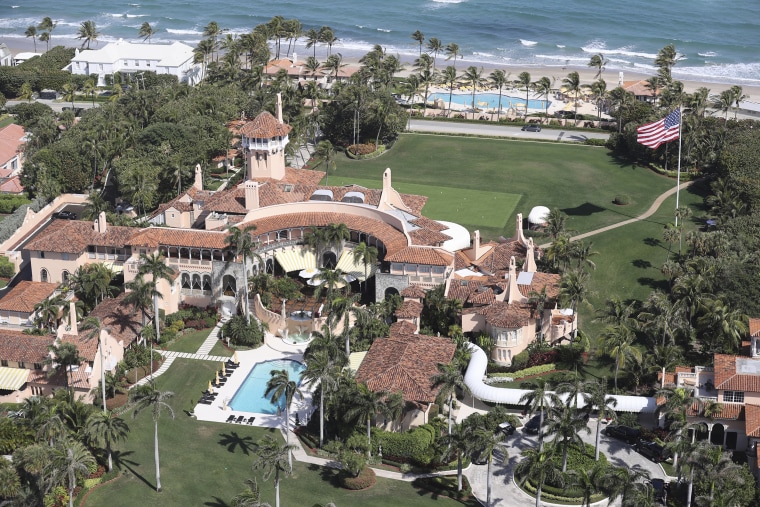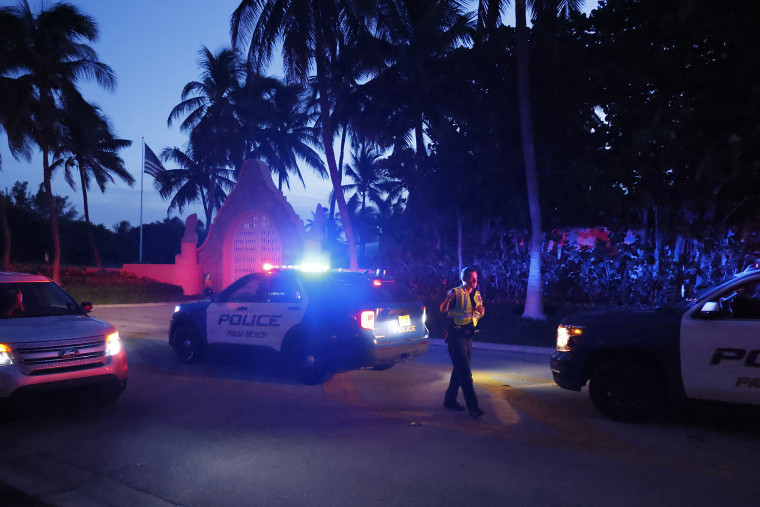Trump allies say he declassified Mar-a-Lago documents. Experts say it’s unclear whether that will hold up.
Trump #Trump

Allies of former President Donald Trump say that any sensitive White House documents he brought with him to his Mar-a-Lago estate had been declassified, but some legal and presidential record experts are skeptical of that claim — and say that Trump could be in criminal jeopardy regardless.
While the Justice Department has a long history of prosecuting cases involving the mishandling of classified information, no such case has ever been brought against a former president — the one government official who can declassify information at will.
“As the facts stand now, his defense would be, ‘I declassified those documents. I am not therefore in possession of classified documents now,’” said Charles Stimson, a senior fellow with the conservative Heritage Foundation and a former federal prosecutor.
Others take a different view — including, it seems, the FBI, which executed a search warrant at Trump’s Florida resort on Monday tied to classified information Trump allegedly took with him from the White House in January 2021. Trump lawyer Christina Bobb said Tuesday that the warrant left by agents indicated they were investigating possible violations of laws dealing with the handling of classified material and the Presidential Records Act.
The 1978 Presidential Records Act, which requires presidents to turn over documents to the National Archives at the end of their administration, lacks an enforcement mechanism, but there are multiple federal laws regarding the handling of classified documents. Trump signed one such law in 2018, increasing the penalty for “unauthorized removal and retention of classified documents or material” from one year to five years in prison.
But those in Trump’s orbit say that no president is personally bound by the removal and retention rules governing classified documents, which can be declassified if the president simply says they are, according to Ric Grenell, who was Trump’s acting director of national intelligence and who handled highly classified information.
“There is no approval process for the president of the United States to declassify intelligence. There is this phony idea that he must provide notification for declassification but that’s just silly. Who is he supposed to notify? I think it’s the height of swampism to think the president should seek bureaucrats’ approval,” Grenell told NBC News, emphasizing that he wasn’t personally speaking for the president.
Richard Immerman, a historian and former assistant deputy director of national intelligence under former President Barack Obama, disagreed and said that, while the president has the authority to declassify documents, there’s a formal process for doing so, and there’s no indication Trump used it.
“He can’t just wave a wand and say it’s declassified,” Immerman said. “There has to be a formal process. That’s the only way the system can work,” because otherwise there would be no way of knowing who could handle or see the documents, he added.
“I’ve seen thousands of declassified documents. They’re all marked ‘declassified’ with the date they were declassified,” Immerman said.
That does not appear to have been the case with some of the documents that were returned to the National Archives from Mar-a-Lago earlier this year. Archivist David S. Ferriero, an Obama appointee, said in a letter to the House Committee on Oversight and Reform in February that his agency had “identified items marked as classified national security information within the boxes” from Mar-a-Lago.
Kash Patel, a Pentagon chief of staff during the Trump administration, told Breitbart News in May that the documents previously recovered from Mar-a-Lago had been declassified by Trump, but their markings were not updated. “Trump declassified whole sets of materials in anticipation of leaving government that he thought the American public should have the right to read themselves,” Patel said then.
“It’s information that Trump felt spoke to matters regarding everything from Russiagate to the Ukraine impeachment fiasco to major national security matters of great public importance — anything the president felt the American people had a right to know is in there and more,” Patel said then, adding that he was with Trump when the then-president said, “We are declassifying this information.”
Patel, who declined comment on the documents earlier this week, told Breitbart that the “White House counsel failed to generate the paperwork to change the classification markings, but that doesn’t mean the information wasn’t declassified.”
A source who had discussed the matter with Trump but was not authorized to reveal those conversations said the former president wasn’t concerned with formal protocol.
“We’ve told him there’s a process and not following it could be a problem but he didn’t care because he thinks this stuff is dumb,” the source said. “His attitude is that he is the president. He is in charge of the country and therefore national security. So he decides.”
Bradley Moss, a lawyer who specializes in national security issues, said, “That’s not how it works.”
“Trump could say we’re declassifying this until he’s blue in the face, but no one is allowed to touch those records until the markings are addressed,” said Moss, a frequent Trump critic on Twitter.
 An aerial view of Mar-a-Lago in Palm Beach, Fla., on March 1, 2021.mpi34/MediaPunch /IPX via AP file
An aerial view of Mar-a-Lago in Palm Beach, Fla., on March 1, 2021.mpi34/MediaPunch /IPX via AP file
He noted that Trump and White House officials should have been aware that more would be needed to declassify documents given their own experience on the issue. In October 2020, Trump tweeted, “I have fully authorized the total Declassification of any & all documents pertaining to the single greatest political CRIME in American History, the Russia Hoax. Likewise, the Hillary Clinton Email Scandal. No redactions!”
When news organizations sought to obtain the supposedly declassified documents, they were told they were still under wraps. Trump chief of staff Mark Meadows said in a sworn court filing in the case, “The president indicated to me that his statements on Twitter were not self-executing declassification orders and do not require the declassification or release of any particular documents.”
In the current dispute, the apparent lack of a paper trail showing that Trump declassified the documents before he left office could be a problem for the former president, said Stephen Vladeck, a University of Texas School of Law professor who specializes in national security.
“President Trump had the power to declassify whichever documents he wanted to while he was president, but not any longer. So I’m not sure it’s at all obvious that he could now claim that he declassified documents while he was still in office if there’s no evidence to support it,” Vladeck said.
The Heritage Foundation’s Stimson has a different view, given that Trump was once “the ultimate declassification authority.”
“If any president decides to declassify a document and doesn’t tell anybody — but he has made the decision to declassify something — then the document is declassified,” Stimson said.
He added that “there’s a rich debate about whether or not a document is declassified if a president has decided but not communicated it outside of his own head,” but Stimson said he would rather be the defense than the prosecution if the dispute ever went to trial.
Vladeck said Trump could still face legal ramifications regardless, because “some of the criminal statutes that are being discussed apply whether or not the underlying information is classified.”
“The Presidential Records Act and other similar statutes constrain President Trump’s ability to do what he wishes with at least some of the official documents from his tenure, regardless of whether those documents include sensitive national security information,” Vladeck said.
Moss said one of the laws that prosecutors could theoretically bring to bear against Trump is 18 U.S. Code § 793 — “Gathering, transmitting or losing defense information.”
The law penalizes “Whoever, lawfully having possession of, access to, control over, or being entrusted with any document, writing, code book … or note relating to the national defense” who “through gross negligence permits the same to be removed from its proper place of custody or delivered to anyone in violation of his trust, or to be lost, stolen, abstracted, or destroyed.” It also penalizes someone who “willfully retains the same and fails to deliver it on demand to the officer or employee of the United States entitled to receive it.”
In this instance, the National Archives said it had been negotiating with Trump’s team for the return of documents since last year, and Moss noted that Trump’s lawyer acknowledged they met with Justice Department as recently as early June about records that were still missing. On Thursday, a source familiar with the matter confirmed to NBC News that Trump also received a federal grand jury subpoena demanding the return of sensitive documents the government believed he’d held onto.
What is still unclear, however, is what exactly investigators were looking for at Mar-a-Lago, and whether or not they found it. “We don’t know what we don’t know,” Moss said.
 Police direct traffic outside an entrance to former President Donald Trump’s Mar-a-Lago estate in Palm Beach, Fla., late Monday. Terry Renna / AP
Police direct traffic outside an entrance to former President Donald Trump’s Mar-a-Lago estate in Palm Beach, Fla., late Monday. Terry Renna / AP
Immerman said given the information that’s already emerged from the National Archives, it’s likely any classified information that went to Mar-a-Lago was mishandled en route. “When they’re moved you can’t just put them in a briefcase — they’re put in pouches that are double locked,” he said. “When I worked in national intelligence I could not carry documents by myself — I had to be accompanied by someone,” Immerman added.
Noah Bookbinder, president of the left-leaning government watchdog group Citizens for Responsibility and Ethics in Washington and a former federal corruption prosecutor, said, “If there were people who knew they were removing records they were not supposed to remove, they could have some legal exposure as well.”
Trump has decried the search as part of an ongoing Democratic “witch hunt” against him. “After working and cooperating with the relevant Government agencies, this unannounced raid on my home was not necessary or appropriate,” he said in a statement Monday.
Stephen Miller, a former senior White House adviser to Trump who still speaks regularly to the former president, said he couldn’t speak to the specifics of how Trump handled or declassified documents, but that suggestions that the former president broke the law represent a “completely backwards upside-down nonsensical understanding of our Constitution” because it essentially makes a president subservient to unelected “preening insufferable bureaucrats” in the branch of government controls.
“The president can choose to use the declassification process or he can choose not to,” Miller said, “or you can merely by his actions move something from the classified to the declassified bucket list.”
Bookbinder, whose organization filed lawsuits against the Trump administration for flaunting record retention policies, said Trump and his aides also should have been well aware that the records they took didn’t belong to them.
“These were all presidential records that should have been turned over to the National Archives,” Bookbinder said.
“The White House counsel informed Donald Trump and others about their requirements under the Presidential Records Act. It would be hard for them to say they didn’t understand what their obligations are under the law here,” Bookbinder said.
Immerman said he was distressed at the possibility of missing records, especially given reports of Trump destroying government documents during his time in office.
“We don’t know what was destroyed,” Immerman said.
“Speaking as a historian, it is extremely disconcerting and upsetting. At this point, I find it highly doubtful that we will be able to write a thorough and accurate history of the Trump administration. There will be holes in it.”